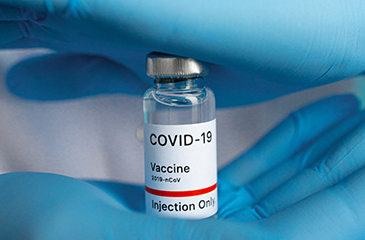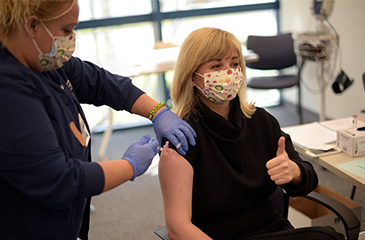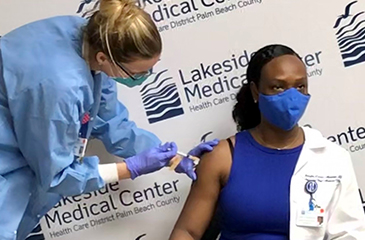HFYH: Should I Get the COVID-19 Vaccine?
 The COVID-19 global pandemic rages on with some locations experiencing a spike in cases through the end of December 2020 and early January 2021. Around the world people have been dealing with the pandemic as best they can by wearing masks, social distancing, and isolating if they become infected with the virus. While everyone will need to continue these precautions for some time in 2021, the first glimmer of hope emerged mid-December 2020 when two vaccines began distribution and administration to health care workers and the highest risk groups living in nursing homes.
The COVID-19 global pandemic rages on with some locations experiencing a spike in cases through the end of December 2020 and early January 2021. Around the world people have been dealing with the pandemic as best they can by wearing masks, social distancing, and isolating if they become infected with the virus. While everyone will need to continue these precautions for some time in 2021, the first glimmer of hope emerged mid-December 2020 when two vaccines began distribution and administration to health care workers and the highest risk groups living in nursing homes.
Currently, two vaccines are authorized and recommended to prevent COVID-19. They include the Pfizer-BioNTech COVID-19 vaccine and Moderna’s COVID-19 vaccine . Both of these vaccines have been authorized by the U.S. Food and Drug Administration (FDA) for emergency use. The emergency use authorization indicates that data on the vaccines shows that the vaccines are safe and effective.
The data for the Pfizer-BioNTech vaccine has shown that the vaccine begins working soon after the first dose and has an efficacy rate of 95% seven days after the second dose . This means that about 95% of people who get the vaccine are protected from becoming seriously ill with the virus. This vaccine is for people age 16 and older and requires two injections given 21 days apart.
The data for the Moderna COVID-19 vaccine has shown that the vaccine has an efficacy rate of 94.1% . This vaccine is for people age 18 and older and requires two injections given 28 days apart.
Other pharmaceutical companies are in the process of obtaining approval for other COVID-19 vaccines. With the emergence of vaccines in record time, many questions surrounding them are being raised.
Why should I trust the COVID-19 vaccine when it was developed so fast?
The FDA has granted Emergency Use Authorizations (EUA) for the Pfizer-BioNTech and Moderna COVID-19 vaccines which have been shown to be safe and effective as determined by data from the manufacturers and findings from large clinical trials. The data demonstrates that the known and potential benefits of this vaccine outweigh the known and potential harms of becoming infected with the coronavirus disease .
 Belma Andric, MD, MPH, Chief Medical Officer, VP for the Health Care District of Palm Beach County, says it is important to understand why the vaccine was released to the public so quickly. “During the pandemic, the blind control study with the vaccine and a placebo was completed much faster than other trials since so many volunteers were willing to participate. As a result, the 30,000-40,000 required participants were lined up very quickly. With so much virus in the community, researchers were then able to identify enough cases of the virus in the placebo group and absence of the virus in the vaccine control group to prove that it works. Additionally, the manufacturers were willing to take the risk to begin producing the vaccine prior to the completion of the studies. This sped up the timeline compared to that of a typical vaccine.”
Belma Andric, MD, MPH, Chief Medical Officer, VP for the Health Care District of Palm Beach County, says it is important to understand why the vaccine was released to the public so quickly. “During the pandemic, the blind control study with the vaccine and a placebo was completed much faster than other trials since so many volunteers were willing to participate. As a result, the 30,000-40,000 required participants were lined up very quickly. With so much virus in the community, researchers were then able to identify enough cases of the virus in the placebo group and absence of the virus in the vaccine control group to prove that it works. Additionally, the manufacturers were willing to take the risk to begin producing the vaccine prior to the completion of the studies. This sped up the timeline compared to that of a typical vaccine.”
What are the possible side effects of a COVID-19 vaccine?
The COVID-19 vaccines may cause mild side effects after the first or second dose. These side effects include:
• Pain, redness or swelling where the shot was given
• Fever
• Fatigue
• Headache
• Muscle pain
• Chills
• Joint pain
 People who receive the vaccine will likely be monitored for 15 minutes after receiving it to see if they have an immediate reaction. Typically, side effects happen within the first three days after vaccination and generally last only one to two days.
People who receive the vaccine will likely be monitored for 15 minutes after receiving it to see if they have an immediate reaction. Typically, side effects happen within the first three days after vaccination and generally last only one to two days.
"I found with discussions with patients, some of them just don't even understand how vaccines work," said Jennifer Dorcé-Medard, DO, Associate Chief Medical Officer at the Health Care District’s rural, acute-care teaching hospital, Lakeside Medical Center after receiving her first of two COVID-19 vaccine doses. "And sometimes it’s just having that one-on-one with your physician to answer your questions that is important."
Can children receive the COVID-19 vaccine?
Currently, there is no COVID-19 vaccine for children under the age of 16. Several companies have begun enrolling children as young as age 12 in COVID-19 vaccine clinical trials. Studies including younger children will begin soon.
Can pregnant or breastfeeding women get the COVID-19 vaccine?
There is no research on the safety of COVID-19 vaccines in pregnant or breastfeeding women. Women who are pregnant or breastfeeding should speak to their health care provider about the risks and benefits.
Can someone with a history of severe allergic reactions get the COVID-19 vaccine?
If someone has a history of severe allergic reactions that are not related to vaccines or injectable medications, they may still get a COVID-19 vaccine. They should then be monitored for 30 minutes after receiving the vaccine.
If someone has had a severe allergic reaction to other vaccines or injectable medications, then they should speak with their doctor about whether they should receive a COVID-19 vaccine. If someone has ever had a severe allergic reaction to any ingredient in a COVID-19 vaccine, the CDC recommends not getting the specific vaccine that includes those ingredients. Anyone who experiences a severe allergic reaction after receiving the first dose of a COVID-19 vaccine should not receive the second dose.
Can I transmit the virus after receiving the vaccine?
The Pfizer-BioNTech and Moderna COVID-19 vaccines do not have the live virus and won’t infect people or enable them to transmit the virus to others.
Should someone who has already had COVID-19 get the COVID-19 vaccine?
People who have already been infected with the COVID-19 virus may experience some natural protection or immunity from reinfection. However, currently it is not clear how long this protection will last. Therefore, since reinfection is possible and the virus can cause other medical complications, it is recommended that people who have already had COVID-19 wait 90 days after their diagnosis and also receive the COVID-19 vaccine.
Does someone who receives the COVID-19 vaccine still need to take safety precautions like wearing a mask?
As we continue to learn more about the protection that a COVID-19 vaccine provides and how long immunity lasts, we still need to take safety precautions like wearing masks, practicing social distancing, washing hands, and staying home when sick.
Safety precautions combined with a growing population who receive the vaccine will reduce the spread of the virus in the community and eventually allow for the relaxation of some of the safety precautions.
“These vaccines are the greatest achievement in modern medicine in the last 100 years,” said Dr. Andric. “It’s a medical miracle. We are privileged to live in a modern time and be able to react so quickly to the pandemic. I feel obligated to receive the vaccine myself in order to protect those more vulnerable to the virus, like the elderly and those with chronic conditions.”
The risk of infection will continue to decrease as more people get vaccinated, making it harder for the virus to circulate. The goal is for the vaccine to allow us to return to a degree of normalcy in 2021.